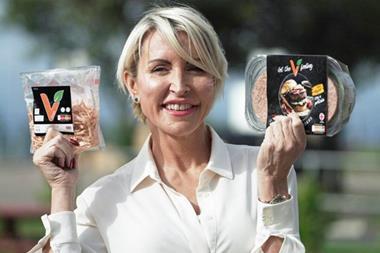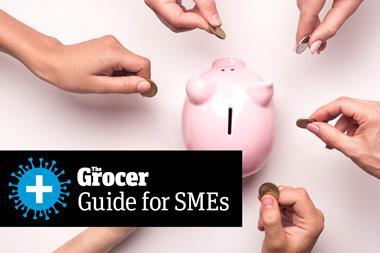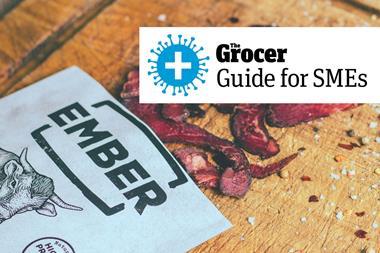![Guide to SMEs_Article image_long[3]](https://dmrqkbkq8el9i.cloudfront.net/Pictures/480xany/0/2/2/184022_guidetosmes_articleimage_long3_307021.jpg)
This is the second in our free Guide for SMEs series, which aims to provide practical, actionable information for small food and drink brands. Read how small businesses can get access to government support here.
The coronavirus crisis has led to a cashflow crunch among smaller food and drink businesses, with many seeing a fall in retail sales and the overnight loss of their entire foodservice business.
Even those brands fortunate enough to report staggering growth in retail or online sales are facing difficulties because they lack the cash to ramp up production – meaning their stocks are at risk of being wiped out.
Naturally, smaller businesses are looking for effective ways to raise money to help them weather the storm. But government support measures are so far proving hard to access, meaning many SMEs are falling through the cracks.
So what options are there for small brands to successfully raise money? And what are the necessary steps to take?
Angel investors
Who are they?
Angel investors are typically industry veterans who have either run their own businesses and successfully sold them or were executives in big companies within the food and drink space.
They tend to back startups at a very early stage, before they become eligible for venture capital investments.
Angels invest their own fortunes, so they carefully select businesses they have an affiliation with.
Pros & cons
Due to their previous experience, angel investors provide added value to a business – such as access to their contacts - and tend to be much more hands-on, advising the companies they invest in on a monthly basis, or sitting on their boards.
Because it is their personal money they are investing, they can be more flexible in terms of the criteria they follow for valuations and business structure.
However, they have limited amounts of cash available and, especially in the current circumstances, are being extra careful with their money.
Furthermore, while an investment fund tends to have targets to deploy money within a certain timeframe, angel investors are under no pressure to invest, so during uncertain times they can just wait before making any decisions.
How to approach them
It can be difficult to find an angel investor unless you have a connection and have been introduced. LinkedIn can be a good place to start and so are syndicates and angel investors’ groups, which can be found on the membership directory of the UK Business Angels Association website.
Venture capital
What is it?
Venture capital is a form of private equity financing provided by funds to fast-growing startups and emerging businesses.
The cash is given in exchange for a stake in the company, with the funds hoping to make a return on their investment once the business proves successful.
There are many different VC funds out there, each with a specific interest in an area of the food and drink sphere – for example plant-based or gluten-free – so it is worth researching which one comes closest to your business ethos before reaching out.
Pros & cons
One of the first things to note is that VC funding might not be appropriate or accessible for every type of small business. Most VCs in the UK look for high-growth, early-stage businesses with revenues of £1m-plus, strong year-on-year growth and a clear path to profitability.
On the flipside, VC funds tend to have deeper pockets with access to higher amounts of cash and are often considered “smart capital”, providing industry expertise and knowledge as well as money.
Some might also add a chairman and non-executive directors to a company’s board – often at a cost.
Under the current circumstances, VCs are taking longer to invest. So, whereas typically a round would close in three months, now the timelines have extended as investors look for further clarity and reassurance on how the business will look after the crisis has passed.
How to approach them
If you are interested in approaching VC funds to secure capital for your business, you can contact one directly or submit information about your company through portals on their websites.
The British Venture Capital Association website provides clear guidance and advice on the major VC players and how to approach them and includes a directory of its members.
Alternatively, you can speak to advisors such as YF Funding.
Crowdfunding
What is it?
Crowdfunding is a form of equity funding that consists of raising money from a large number of members of the public, who can invest any amount starting from £10.
It is enabled by online platforms such as Seedrs and Crowdcube, who help brands access investment in exchange for a cut.
When a crowdfunding target is set, brands have a defined timeframe to reach that target, otherwise they finish the campaign empty-handed.
Pros & cons
As a public way of raising money, crowdfunding can also help increase a brand’s exposure, attracting new customers and engaging the existing community of customers by creating a group of brand ambassadors.
It can also be a good way to top up funding secured via private investment from angels or VCs.
The downside to it being such a public way to raise funds is brands have to get on board with having a lot of information out there for anyone to easily access – including potential competitors.
Investors from the crowd get on board to support brands they are passionate about, so they are not necessarily always looking for a financial return.
However, these investors tend to be less sophisticated and do not provide as much insight to help grow the brand.
How to access it
There are a few platforms facilitating crowdfunding – the most popular being Seedrs and Crowdcube – so you can start by visiting their websites and getting in touch with them directly.
There are several pieces of information and due diligence you will have to provide depending on your chosen platform, but you will likely be assigned someone to guide you through the process.
Setting up a campaign is also quite a lengthy process, which can typically take up to three months from beginning to end and includes several expenses, such as fees you will have to pay the platforms, and costs associated with producing a video, putting together a pitch deck and PR & marketing costs to ensure the campaign’s success.
Crowdfunding expert tips
Here are Seedrs’ Scott Simpkin’s top three tips for brands looking to embark on a crowdfunding raise during coronavirus.
- Try and limit the amount you raise. Given the uncertainty, now is probably not the time for a large growth round, and limiting your round size will mean you’ll have to do less work to fill it up.
- Consider raising through an Advanced Subscription Agreement. The idea is you can accept money now for the short term without revaluing your business, and give investors a discount on a future round when you’re in the position to grow. It’s good for both businesses and investors in times of uncertainty.
- Get creative with your community! The bottom line is every good business will have customers that want them to succeed and get through this, and great rewards packages as part of equity will be more attractive than ever now.
Accelerator programmes/Incubators
What are they?
Accelerators or incubator programmes tend to be schemes set up for seed businesses with high-growth potential. Typically, they are meant for businesses at a proof-of-concept stage rather than revenue-generating ones.
They include mentorship, advice and training on different business aspects such as sales, marketing and NPD and often end with a public pitch event or demo day to help businesses secure investment.
Pros & cons
As these schemes are not set up solely to provide investment, those that do tend to offer much smaller amounts of cash than other forms of funding.
How to access them
There are many different accelerator programmes or incubators, each targeting a specific area of the food and drink industry.
If you are interested in joining the next cohort, find one in line with your company and apply for it directly through its portal.
Note that many have precise deadlines and timeframes, so they might not be the most effective way to secure emergency funds fast during the current crisis.
Here’s some of the most popular ones:
Corporate venture arms
What are they?
They are very similar to accelerator programmes but are established by big corporates in the food and drink sector.
Pros & cons
Brands that get on to them and prove successful have the backing of a bigger company, which in times of crisis can help provide funding quickly.
However, at the moment corporates are dealing with internal issues posed by the coronavirus outbreak and are therefore less inclined to take on board new brands.
How to access them
Like for accelerator programmes, brands who want to access a corporate venture arms should get on their websites and pitch their idea and business concept.
Some of the most popular ones include:
- Distil Ventures by Diageo
- Springboard by Kraft Heinz
- JLab by John Lewis and Waitrose
- Nutrition Greenhouse by PepsiCo
Case study
Rejuvenation Water was able to hit its £75k crowdfunding target within eight days of launching on Crowdcube earlier this month.
Founder Kris Ingham said the campaign planning had started “well before coronavirus” after the brand successfully launched in Tesco and Sainsbury’s towards the end of 2019.
“Coronavirus simply moved the timing of our round forward,” he added.
Due to the current lockdown situation, Rejuvenation Water was unable to produce a campaign video, so the set-up of the page was “relatively quick”.
“It took us around two weeks from initial conversation to launch,” Ingham said – adding that as this wasn’t his first crowdfunding round, he already knew the process and information required in advance.
Rejuvenation Water’s existing investor base pledged a significant amount of funding before the campaign launched to the public. However, Ingham said he noticed a change in investor sentiment, with some pulling back to “preserve capital or to buy at the bottom”.
Crowdfunding wasn’t Ingham’s initial choice to raise funding to cope with the coronavirus outbreak. However, it provided a platform to bring in existing investors and the public together quickly.
“We had a number of conversations ongoing with angels and funds but, with coronavirus, it became apparent that the likelihood of these conversations closing had been reduced and, if they did close, it was going to take much more time.”
Here are Ingham’s top three tips for brands looking to raise money through crowdfunding platforms:
- Be realistic. With targets and, in particular, valuation. Too-high valuations won’t hold up in the current times, so we decided on a valuation that offered value to investors in order to ensure we were successful in hitting our target.
- Engage with your network. You may find many people have been quietly watching your business progress and weren’t aware of how they could invest. This is a great opportunity to build/strengthen your brand community.
- Boost sales while you’re raising. The crowdfunding platforms have amassed a great number of subscribers over the years. Even if individuals aren’t actively investing, it’s an opportunity to acquire long-term customers. Simply creating an offer code on your website, and posting this on the campaign, allows potential investors to try your products before they invest, while boosting your sales. We created an Amazon code for Crowdcube investors prior to the bank holiday weekend and amassed over 80 redemptions over a single weekend.
*This information was sourced with the help of Justine MoldenhauerandChristopher Gale from YF Funding, Scott Simpkin from Seedrs and Kris Ingham from Rejuvenation Water.




















No comments yet